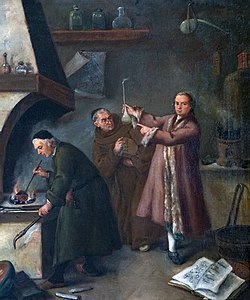Alchimia: l'oro della conoscenza
| Author | Andrea Aromatico |
|---|---|
| Original title | Alchimia: l'oro della conoscenza |
| Translator | Jack Hawkes |
| Cover artist | Joseph Wright of Derby (IT & FR eds.) Basil Valentine, Matthäus Merian & Pietro Longhi (US ed.) |
| Language | Italian |
| Series | Universale Electa/Gallimard●Storia e civiltà |
Release number | 86 |
| Subject | Alchemy |
| Genre | Nonfiction monograph |
| Publisher | IT: Electa/Gallimard FR: Éditions Gallimard US: Harry N. Abrams |
Publication date | 1996 |
| Publication place | Italy |
Published in English | 2000 |
| Media type | Print (Paperback) |
| Pages | 176 pp. (IT); 144 pp. (FR & US) |
| ISBN | 978-88-445-0104-4 |
| OCLC | 644792844 |
| Preceded by | Urbi et Orbi: i papi nella storia |
| Followed by | La Moda: usi e costumi del vestire |
| Website | www |

The book Alchimia: l'oro della conoscenza (lit. 'Alchemy: The Gold of Knowledge') is part of an Italian collection "Universale Electa/Gallimard", published by Electa/Gallimard in 1996 in their Storia e civiltà series. The French edition—Alchimie, le grand secret—published by Éditions Gallimard, came out in the same year, but Gallimard shortened the "Documents" section at the back of the book. The English edition, entitled Alchemy: The Great Secret, is based on the French instead of the original Italian, was released in the United States in 2000, distributed by Harry N. Abrams in the "Abrams Discoveries" series. It is a pint-sized coffee table book, replete with colour plates, all well reproduced, with useful information in the captions. There are three chapters: I, "The Concept of Alchemy" (Lo spirito e la materia); II, "The Theory of Alchemy" (I maestri e la grande ricerca); III, "The Practice of Alchemy" (Il fuoco e la pietra filosofale). These are followed by a section of five "Documents" (Italian edition has ten [note 1] ), which are excerpts taken from well-known texts on alchemy: 1, The earliest sources; 2, The medieval mystics and scientists; 3, The triumph of Hermetism in the Renaissance; 4, Alchemy in the modern era; 5, Alchemy in literature. There is a list of further reading, where is also included a number of English sources. The book closes with a list of illustrations and an index. It is the only work by Andrea Aromatico which has been translated into English, and other translations including Japanese, Polish, South Korean, Spanish and simplified Chinese, all of which are based on the French version.
The book opens with a series of reproductions of some elaborate images from Splendor Solis , accompanied by texts taken from the Emerald Tablet , the essential text of Hermetic philosophy, or alchemy, which was born of the oldest civilisations, and the transformation of metals has become one of the emblematic acts. But the search for "philosophers by means of fire" is not limited to the mere transmutation of lead into gold; it is indeed a philosophy, which most often takes the form of an "experimental metaphysics", and which has also given birth to a language—the Qabalah—and an extraordinary florilegium of images and symbols. Aromatico explores in the book this compound of science and myth, examining ancient texts and illuminated manuscripts to shed light on an enigmatic science of spells, ceremonies, and secret beliefs.

